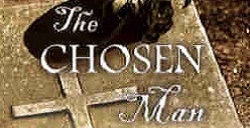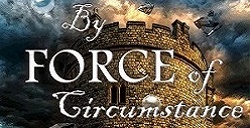

From By Force of Circumstance
Chapter 1
Genoa, early summer 1644.
Ludo sat down in Leonora’s much travelled cane chair in the gentle dark of their chamber and rested his head, now greying at the temples, against her bright Indian cushions. “It was Vico,” he said. “Nurse is with him. He was talking in his sleep. It feels strange for them, sleeping on dry land after so many months on a rolling ship.” Ludo was referring to the small twins in the nursery along the passage. “You should go back to sleep as well,” he said softly, noticing his wife’s flushed face in the candlelight.
Leaning forward Ludo put a hand to her brow, she was sweating again: another bout of malaria, and in the final third of her pregnancy. He lifted a lemon-scented cloth from a bowl and dabbed her forehead. “Better?”
Hot fingers touched his. Leonora started to say something, then suddenly she was sitting bolt upright clenching the sheets.
“Has it started?” he asked anxiously. “Surely, it is too soon.”
“Yes – yes,” the response was a twisted hiss. “Too soon.”
“I’ll fetch Nurse and send for the midwife.”
As Ludo made his way back to the children’s room there was a loud, insistent banging on the door below. Ignoring it, he raced to get the twins’ nurse, who was already crossing the landing towards him. “Go to Donna Leonora,” he said.
“Ludo!” Leonora screamed. The battering below continued.
“I’m going for the midwife, carina. Here’s Nurse.” Ludo placed his large paw on the local woman’s narrow shoulder. “Stay with my wife,” he said urgently. “I’ll send a servant up with water and fetch the midwife myself.”
The small woman nodded and entered Leonora’s chamber.
As Ludo reached the turn in the stairs one of their new maids was reaching the front door. “Tell whoever it is to go away, we are not at home.” Ludo stopped in his tracks, “No, don’t, I’ll go. You go for the midwife. You know these streets better than I do. Tell her to hurry!” The battering became more insistent. “Go on, run! I’ll deal with this.” Whoever had come knocking at this time of night, and in such a manner, had an emergency of their own that no chit of a girl could deal with.
Ludo pulled back the first bolt just as Leonora’s second wail of pain rent the calm of their new home forever. “What?” he demanded, not looking at the visitor because he was staring back up the stairs. A rough hand pulled him out of the doorway.
Ludo was tall and broad-shouldered but the brute manhandling him was bigger. A much shorter man flanked by two men-at-arms in fancy livery handed him a folded letter with one hand and brandished something like a rolled document in the other. “You are instructed to come with us,” the letter-bearer stated.
Struggling to free himself, Ludo retorted, “Instruct who you please, I’m going nowhere. My wife is in childbed.”
“That’s no matter to us at present,” the short man said. “Bind him!”
One of the men in livery flourished a length of rope from concealment and began winding it rapidly around Ludo’s arms and body. The second magicked a thickly-knotted truncheon from nowhere, and the messenger stuffed a rag in his mouth.
“No!” Ludo’s voice was a muffled scream.
The novel is published by Penmore Press Ltd.
Copyright © A.M.Arredondo. All Rights Reserved.









